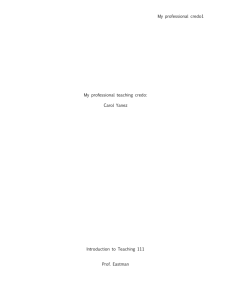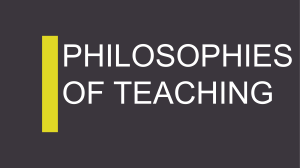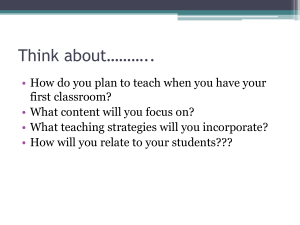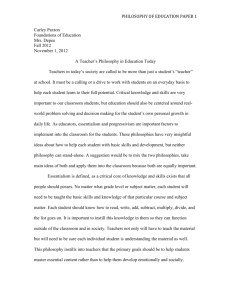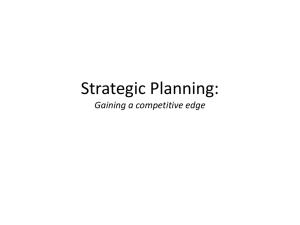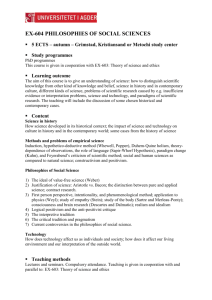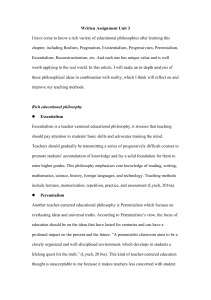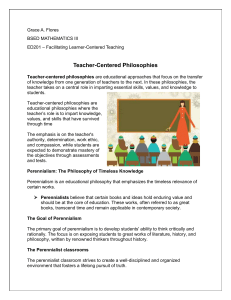Ch 8 Notes.doc
advertisement
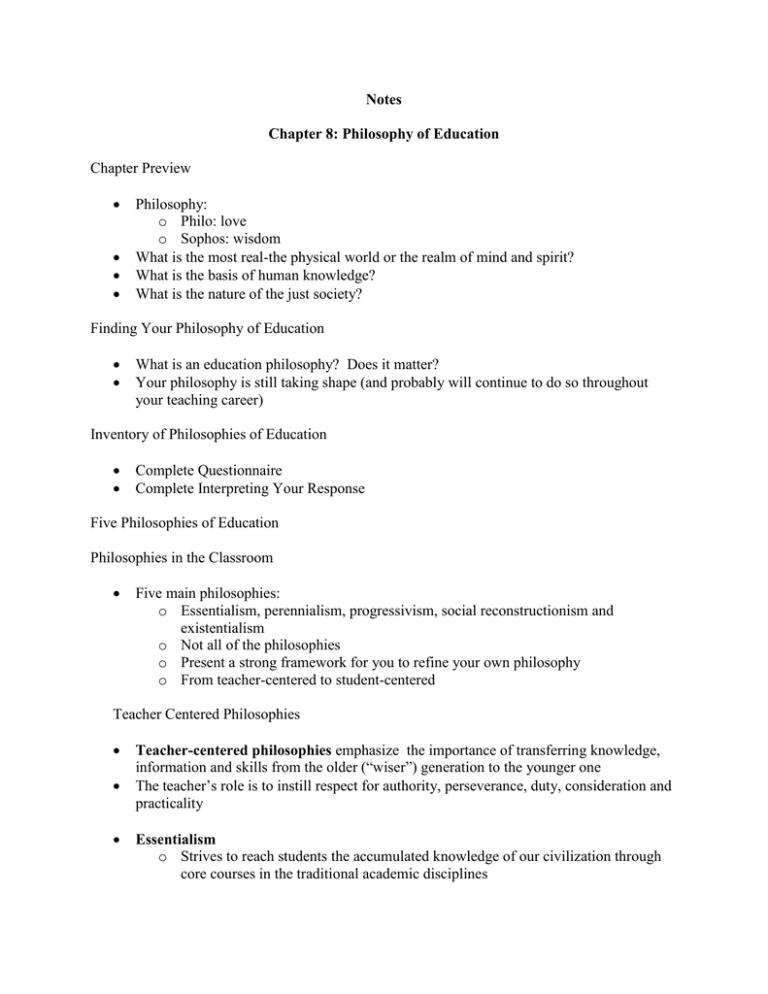
Notes Chapter 8: Philosophy of Education Chapter Preview Philosophy: o Philo: love o Sophos: wisdom What is the most real-the physical world or the realm of mind and spirit? What is the basis of human knowledge? What is the nature of the just society? Finding Your Philosophy of Education What is an education philosophy? Does it matter? Your philosophy is still taking shape (and probably will continue to do so throughout your teaching career) Inventory of Philosophies of Education Complete Questionnaire Complete Interpreting Your Response Five Philosophies of Education Philosophies in the Classroom Five main philosophies: o Essentialism, perennialism, progressivism, social reconstructionism and existentialism o Not all of the philosophies o Present a strong framework for you to refine your own philosophy o From teacher-centered to student-centered Teacher Centered Philosophies Teacher-centered philosophies emphasize the importance of transferring knowledge, information and skills from the older (“wiser”) generation to the younger one The teacher’s role is to instill respect for authority, perseverance, duty, consideration and practicality Essentialism o Strives to reach students the accumulated knowledge of our civilization through core courses in the traditional academic disciplines o Aim to instill students with the “essentials” of academic knowledge, patriotism, and character development o Assumes there is a core body of knowledge that must be mastered in order for a person to be considered “educated” Information is key to a good education o Essentialist Theories Urge that an essential core curriculum of academic skills and knowledge be taught to all students Math, Science, History, Foreign Language, Literature Frown upon vocational and elective teaching Required to master information and basic techniques Move from less complex to more-so Mastery of material promotes grade level movement Academically rigorous for all learners Oriented around the teacher Teachers and administrators decide what students learn Taught to be culturally literate Perennialism o Perennialists organize their schools around books, ideas and concepts Criticize essentialists for the vast amount of factual information they require students to absorb in their push for “cultural literacy” o “Idea” oriented; considers education to consist of becoming acquainted with the great writing and thinking throughout history Understanding is key to a good education Great Books: works by history’s finest thinkers and writers, books as meaningful today as when they were first written o Perennialism Theories Believe in rigorous intellectual curriculum “Perennial” means everlasting Focuses on enduring themes and questions that span the ages Accepts little flexibility Factual knowledge is more important than conceptual understanding Conduct seminars where students and teachers engage in mutual inquiry Student-Centered Philosophies Progressivism o Organizes schools around the concerns, curiosity and real-world experiences of students o Seeks to make education practical and applicable to the needs of students and society Making knowledge and skills meaningful Progressivism Theories o Believe education should be a perpetually enriching process of ongoing growth o Not only preparation for adulthood o Center education on experiences, interests and abilities of the student Teachers: Plan lessons that encourage curiosity and guide students’ great levels of learning Use games and hands-on-experiences Facilitate learning by helping students formulate meaningful questions and devise strategies to answer those questions o Answers are not found on lists or in “great books;” they are found through discovery and real world experiences o Children work together to solve problems, generate ideas, and crate new knowledge o John Dewey: people learn best through social interaction in the real world; there is no substitute for doing things The mind should be trained to analyze experience thoughtfully and draw conclusions objectively o The Laboratory School: set the stage for the progressive education movement Founded 1896 Included a science lab, art room, woodworking shop and kitchen Learn by doing Learn through social interaction: encourage group efforts Children were not promoted from one grade to another Children were grouped according to their individual interests and abilities Social Reconstructionism o Social Reconstructionism: Encourages schools, teachers and students to focus their studies and energies on alleviating pervasive social inequities o Reconstruct society into a new and more just social order Social challenges provide a natural (and moral) direction for curricular and instructional activities o Social Reconstructionist Classroom: Teachers lessons intellectually inform and emotionally “stir” students about surrounding inequities Teacher as facilitator: assisting students in focusing their questions, developing a strategy, helping to organize visits and ensuring that the data collected and analyzed meet standards of objectivity The class is engaged in a genuine effort to improve society o Praxis: doctrine that when actions are based on sound theory and values, they can make a real difference in the world Existentialism o Existentialism: asserts that the purpose of education is to help children find the meaning and direction in their lives and if rejects the notion that adults should or could direction meaningful learning for children o Stresses “authenticity”-the commitment to finding true being Discovering one’s own meaning in life Must look within ourselves to discover our own truth or our own purpose in life o Existentialist Theories Provide some curricular structure but affords great latitude in their choice of subject matter Gives a wide variety of options Vocational education: more about teaching students about themselves and their potential than earning a livelihood Focus on the individual; self-paced and self-directed Teaching students what adults believe they should learn is neither efficient nor effective Most of such learning will be forgotten Can Teachers Blend These Five Philosophies? Can we mix and match philosophies to blend them and make a philosophy best for us? o Depends who you ask o Many will say yes! Purist Model: advocates will agree blending is a good compromise, but will argue that much is lost when blending occurs
